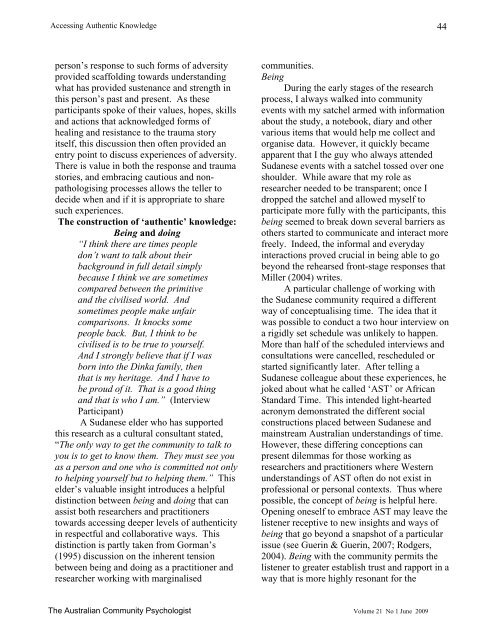issue 1 09 - APS Member Groups - Australian Psychological Society
issue 1 09 - APS Member Groups - Australian Psychological Society
issue 1 09 - APS Member Groups - Australian Psychological Society
Create successful ePaper yourself
Turn your PDF publications into a flip-book with our unique Google optimized e-Paper software.
Accessing Authentic Knowledge44person’s response to such forms of adversityprovided scaffolding towards understandingwhat has provided sustenance and strength inthis person’s past and present. As theseparticipants spoke of their values, hopes, skillsand actions that acknowledged forms ofhealing and resistance to the trauma storyitself, this discussion then often provided anentry point to discuss experiences of adversity.There is value in both the response and traumastories, and embracing cautious and nonpathologisingprocesses allows the teller todecide when and if it is appropriate to sharesuch experiences.The construction of ‘authentic’ knowledge:Being and doing“I think there are times peopledon’t want to talk about theirbackground in full detail simplybecause I think we are sometimescompared between the primitiveand the civilised world. Andsometimes people make unfaircomparisons. It knocks somepeople back. But, I think to becivilised is to be true to yourself.And I strongly believe that if I wasborn into the Dinka family, thenthat is my heritage. And I have tobe proud of it. That is a good thingand that is who I am.” (InterviewParticipant)A Sudanese elder who has supportedthis research as a cultural consultant stated,“The only way to get the community to talk toyou is to get to know them. They must see youas a person and one who is committed not onlyto helping yourself but to helping them.” Thiselder’s valuable insight introduces a helpfuldistinction between being and doing that canassist both researchers and practitionerstowards accessing deeper levels of authenticityin respectful and collaborative ways. Thisdistinction is partly taken from Gorman’s(1995) discussion on the inherent tensionbetween being and doing as a practitioner andresearcher working with marginalisedcommunities.BeingDuring the early stages of the researchprocess, I always walked into communityevents with my satchel armed with informationabout the study, a notebook, diary and othervarious items that would help me collect andorganise data. However, it quickly becameapparent that I the guy who always attendedSudanese events with a satchel tossed over oneshoulder. While aware that my role asresearcher needed to be transparent; once Idropped the satchel and allowed myself toparticipate more fully with the participants, thisbeing seemed to break down several barriers asothers started to communicate and interact morefreely. Indeed, the informal and everydayinteractions proved crucial in being able to gobeyond the rehearsed front-stage responses thatMiller (2004) writes.A particular challenge of working withthe Sudanese community required a differentway of conceptualising time. The idea that itwas possible to conduct a two hour interview ona rigidly set schedule was unlikely to happen.More than half of the scheduled interviews andconsultations were cancelled, rescheduled orstarted significantly later. After telling aSudanese colleague about these experiences, hejoked about what he called ‘AST’ or AfricanStandard Time. This intended light-heartedacronym demonstrated the different socialconstructions placed between Sudanese andmainstream <strong>Australian</strong> understandings of time.However, these differing conceptions canpresent dilemmas for those working asresearchers and practitioners where Westernunderstandings of AST often do not exist inprofessional or personal contexts. Thus wherepossible, the concept of being is helpful here.Opening oneself to embrace AST may leave thelistener receptive to new insights and ways ofbeing that go beyond a snapshot of a particular<strong>issue</strong> (see Guerin & Guerin, 2007; Rodgers,2004). Being with the community permits thelistener to greater establish trust and rapport in away that is more highly resonant for theThe <strong>Australian</strong> Community Psychologist Volume 21 No 1 June 20<strong>09</strong>
















